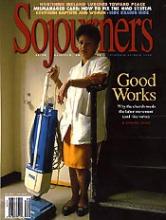Tens of millions of people were forcibly taken from their homes in Africa in the 17th and 18th centuries. Those who survived the arduous "middle passage" across the Atlantic formed the backbone of the New World's economyand their enslavement stands as our nation's original sin that continues to reverberate even today, in the view of the organizers of a yearlong procession of remembrance and atonement.
More than 100 walkers set out from western Massachusetts this spring as part of the "Interfaith Pilgrimage of the Middle Passage." The pilgrimage retraces in reverse the steps of the trans-Atlantic slave trade, traveling about 15 miles a day down the Eastern Seaboard, across the deep South, and eventually across the ocean and then down the African coast to Cape Town, South Africa. Archbishop Desmond Tutu of South Africa called the journey "a remarkable opportunity to confront the reality of the horrors of slavery" and to examine "our attitudes and prejudices in the present day."
Along the way, marchers are participating in public events intended to "change the hearts of people who either directly or indirectly have benefited from, or been afflicted by, the 'peculiar institution' of slavery," according to Rev. Edward Rodman, Canon Minister of the Episcopal Diocese of Massachusetts. For instance, as the walkers passed through Washington, D.C., in mid-July, they joined local supporters in a Day of Remembrance on the National Mallthe largest slave auction site in the countryand vigiled at the World Bank and IMF buildings in support of the Jubilee 2000 call for cancellation of the debt of African nations.
Read the Full Article
